Category G: Engagement
Influencing governments and policymakers and stakeholder engagement
Category G consists of two criteria
- G1 Lobbying and influencing governments and policymakers
- G2 Stakeholder engagement
To perform well in this category, a company should:
- Develop a policy through which they commit to lobbying only in support of measures aligned with the prevention and addressing of malnutrition, and which are supporting public health interests, with emphasis on independent, peer-reviewed science.
- Establish effective management systems for governing lobbying activities, such as Board oversight, audits, and internal whistleblowing systems.
- Disclose lobbying activities relating to nutrition issues, as well as membership and financial support of industry associations and other lobbying organizations, Board seats on such bodies, and any governance conflicts of interest.
- To play an active and constructive part in supporting governments’ efforts to combat all forms of malnutrition.
- Conduct comprehensive, well-structured stakeholder engagement focused on improving nutrition-related business strategy and performance, and provide evidence and examples showing how stakeholder engagement has led to improvements of policies and practices.
Ranking on Engagement
- G1
- Influencing policymakers
- G2
- Stakeholder engagement
- *
- Did not provide information to ATNI
Nestlé leads this category with a strong, well-structured approach to stakeholder engagement to gather feedback on its nutrition-related strategies and programs. FrieslandCampina and Unilever follow closely behind with strong commitments to, and examples of, supporting governments’ efforts to address malnutrition, while also showing evidence of engaging with a wide range of stakeholders in developing their nutrition strategies, policies, and programs.
Category Context
Category G focuses on companies’ engagement with government bodies and representatives, and with civil society and academia on nutrition-related issues. Companies are assessed on their efforts to support governments in their efforts to address nutrition priorities, and how they influence legislation and regulation through lobbying. Companies have the potential to make a positive impact by actively supporting the adoption or revision of regulations to improve public health, for example, on topics such as product labeling, use of claims, nutrition standards, responsible marketing, and fiscal measures.
However, as in other sectors, food and beverage companies face increasing scrutiny due to various forms of lobbying that promote policies inconsistent with public health interests, as well as their lack of transparency in doing so.
In addition, companies are assessed on their engagement with expert stakeholders (including international and national organizations, civil society, and academics). Engagement of this nature can help companies strengthen their strategies and policies, and provide valuable feedback on their relevance and effectiveness for improved public health outcomes.
ATNI’s second COVID-19 report found that many global food and beverage manufacturers have been outspoken in their support for governments in tackling COVID-19. Some have established formal partnerships with governments to address the crisis, while others have responded with donations of Personal Protective Equipment (PPE) and medical equipment, as well as food and monetary contributions.
ATNI’s report also found examples of lobbying by food and beverage companies and industry associations that are at odds with public health priorities. For example, positioning unhealthy food categories as “essential products” and continuing to lobby against the development of food regulations and policies consistent with public health. These findings emphasize the need for companies to commit to lobby only in support of measures to improve nutrition and health, and to be transparent about their lobbying activities – both during the crisis and beyond.
While ATNI found some examples of partnerships with government agencies and NGOs to address the pandemic, it also found many examples of companies pursuing their own interventions without clear evidence of consulting experts or key stakeholders. As a result, many have been criticized for donating unhealthy products, for example. This reinforces the need for companies to engage with stakeholders with nutrition expertise in the development of nutrition strategies and programs to ensure that they are designed and executed in a way that ensures and maximizes positive impact on public health.
Relevant changes in methodology
The methodology for the criterion on lobbying and government engagement (G1) has integrated several elements of the Responsible Lobbying Framework, launched in June 2020 (see Box 1). These include whether companies commit to ensuring their lobbying activities support an evidence-based approach to policy making, with emphasis on independent, peer-reviewed science, and if their Codes of Conduct comprise measures to prevent bribery and corruption in its relations with public officials – for example, the offering and receiving of gifts, hospitality, or other financial and in-kind incentives. The latter also includes an assessment of the companies’ management systems to control lobbying, such as whether companies: 1) have assigned to their Board oversight of lobbying policy positions, processes and practices, including lobbying by third parties; 2) carry out internal or independent audits of the company’s lobbying activities; and 3) have an internal whistleblowing mechanism to allow staff to raise concerns that the company’s lobbying policy and/or Code of Conduct has been breached.
The criterion assessing engagement with stakeholders regarding addressing nutrition (G2), meanwhile, has undergone significant changes, with twice the number of indicators as in 2018. There is now more in-depth assessment of the types of stakeholders companies engage with to inform their nutrition strategy and policies; the extent to which companies seek specialist external experts’ advice on how to prevent and address obesity and diet-related NCDs, undernutrition, and micronutrient deficiencies (previously assessed in Category A); and companies’ adherence to various international Codes of Conduct and initiatives that address food loss and waste (FLW).
More details about the changes in the methodology can be found in the methodology section of this Index.
Global Index 2021 MethodologyBox 1. The Responsible Lobbying Framework
In 2019, ATNI was involved in developing the Responsible Lobbying Framework (RLF), a free, sector-agnostic tool for voluntary self-regulation that sets out globally applicable principles and standards of responsible lobbying. It establishes the principles and practical steps that organizations should take to ensure their lobbying is transparent, accountable, consistent and consistent with public interest. It was launched in June 2020.
Several elements of the Framework have been integrated into the methodology for the criterion on lobbying and government engagement (G1) which now includes indicators regarding lobbying legitimacy and management systems, while reinforcing the indicators regarding transparency.
Key Messages
- The average score in Category G has decreased by 0.6 since 2018 to 2.9. However, this overall figure masks slight improvements in lobbying and government engagement practices (G1) that were outweighed by lower scores in engagement with stakeholders regarding addressing nutrition (G2), which can largely be attributed to changes to the methodology since 2018.
- While just two companies have publicly committed to lobbying only in support of measures to improve health and nutrition, and no companies were found to explicitly commit to only do so on the basis of peer-reviewed science, it is encouraging that nearly all companies have anti-corruption measures and whistleblowing mechanisms in place. Meanwhile, 15 companies have additional lobbying management procedures in place, such as Board oversight of lobbying positions and internal audits of lobbying activities.
- Disclosure on lobbying activities remained broadly consistent with 2018 in terms of extent and number of companies doing so, although many more companies have begun disclosing lobbying positions on specific and relevant nutrition topics – notably front-of-pack labelling and health claims regulation. Nevertheless, there remains a lot of room for improvement, particularly with regard to disclosure of trade association membership, paid lobbyist activity, and governance conflicts of interest.
- Compared to 2018, more companies have made commitments to and/or provide examples of supporting governments in their efforts to prevent and address malnutrition. However, the majority primarily focus on their home markets or a handful of specific contexts; only Nestlé, and to some extent Danone, Unilever, and PepsiCo, demonstrate global commitment and delivery. Moreover, whereas in 2018, seven companies were found to publicly disclose a commentary on their lobbying measures to prevent and address all forms of malnutrition, only three companies were found to do so in this Index.
- While it is positive to see two more companies engaging with stakeholders to improve or develop their nutrition strategies, policies, or programs, fewer appear to do so in a comprehensive, structured manner with both domestic and international stakeholders, or to have formal panels of experts. Public disclosure about these activities was also limited.
General Recommendations
- Companies are encouraged publicly commit to lobby more responsibly; that is, to prioritize and only lobby in support of measures designed to improve health and nutrition and address malnutrition, and to ensure their lobbying is grounded in independent, peer-reviewed science. For guidance on this approach, companies can consult the Responsible Lobbying Framework.
- To reinforce this, companies are recommended to significantly increase the disclosure of their lobbying activities, including expenditure, third parties they support (such as trade associations and lobbying firms), and the issues they support. In doing so, they should go beyond legal compliance and publish this information more comprehensively on their own domains. They could also expand the geographic scope of their lobbying reporting beyond their home markets.
- When developing or updating their nutrition-related strategies, policies, or programs, companies should ensure they conduct a comprehensive and well-structured stakeholder engagement and expert consultation process. Through two-way communication, gathering feedback, and learning, companies can ensure their strategies, policies or programs effectively contribute to addressing public health issues in their respective markets.
Noteworthy changes and best practices
-
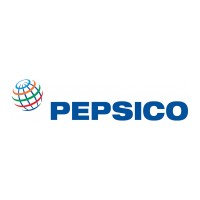
- G
PepsiCo was one of only 2 companies (alongside Danone) found to publicly express a commitment to only engage with governments and policymakers with the intention of supporting measures to prevent and address malnutrition; with PepsiCo being the most transparent regarding disclosure of its lobbying positions on important topics.
-
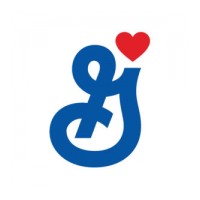
- G
General Mills has significantly improved its disclosure on lobbying related to nutrition, publishing a web page describing numerous examples of its engagement with the US government (at both Federal and State levels) in relation to school feeding programs and addressing food insecure communities; supporting strong Dietary Guidelines for Americans and redefining the official ‘Healthy’ definition; and labelling and marketing. Many of these descriptions include links to formal position statements and public consultation submissions on these matters.
-
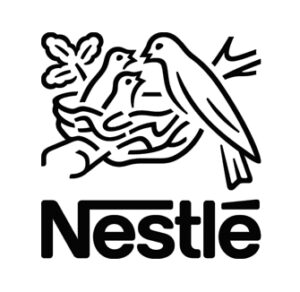
- G
Nestlé works with the Sri Lankan Government to raise awareness of iron deficiency and how to address it, reaching an estimated 13 million people. The company has partnered with Ecuador’s Ministry of Education to produce and broadcast an educational TV series, “The Invincible Team”, to promote healthier habits, while also collaborating with regional governments in Mexico to promote a program aiming to improve the adoption of healthy lifestyles through educational activities for women. They also have a range of examples in India that were featured within the 2020 India Spotlight Index.
The Feeding Infants and Toddlers Study (FITS) in the US has explored the eating patterns and nutritional intake of children during their first four years of life. This initiative was expanded in 2014 to include older children (the Kids Nutrition and Health Study, KNHS) and additional countries; and now comprises China, Mexico, Russia, Australia, the US and the Philippines. The studies provide a comprehensive picture of children’s dietary intakes, including nutrients, timing and types of foods consumed at each meal, and feeding practices. In 2019, Nestlé started research projects in Brazil, the United Arab Emirates and Nigeria. Since 2014, FITS and KNHS have resulted in more than 60 papers in collaboration with research partners around the world.
-
- G
In their latest ‘Wellbeing Milestones’ report, Kellogg describes in detail its engagement with numerous governments in the US, Latin America, and Europe to address hunger and malnutrition among children from low-income households. Kellogg also states that it actively engages in ongoing conversations with multilateral organizations, governments, and NGOs to identify risks and opportunities, inform new programs and food innovations, and further inform its Wellbeing Strategy, commercial strategy, and corporate policies on undernutrition.
G1 Lobbying and influencing governments and policymakers
Scores improved significantly overall, with all but two companies increasing their score – most by a considerable margin – and the average score almost doubling. This can partly be explained by changes in the methodology, with companies now being credited for practices such as including anti-bribery policies in their Codes of Conduct and whistleblowing mechanisms that are common to nearly all of the companies assessed. Many companies were also credited for having other management systems related to lobbying, which had not previously been researched by ATNI. There was also evidence of significant improvement in some respects since 2018, such as 10 more companies disclosing their lobbying positions on certain important nutrition-related topics, including front-of-pack labelling and health claims regulation, and more companies committing to support governments’ efforts to combat all forms of malnutrition. The scores for Arla, Danone, Nestlé, Kellogg and Unilever increased most significantly, with Nestlé leading this criterion.
Danone and PepsiCo were the only companies found to publicly express a commitment to only engage with governments and policymakers with the intention of supporting measures to prevent and address malnutrition. For example, in its 2020 Advocacy Policy, Danone states that, in addition to lobbying in support of its mission of “bringing health through food to as many people as possible”, it will do so “with the interests of the consumer in mind and the will to meet public health goals (of which tackling obesity, mal- or under-nutrition).”
No other companies expressed new commitments to this effect, while several companies that had made a similar commitment previously no longer appeared to do so publicly at the time of research. Seven companies, meanwhile, made commitments to the effect of ensuring that their lobbying is evidence-based or scientifically-grounded. However, none explicitly stated that this scientific evidence must be ‘independent’ and ‘peer-reviewed’, as specified in the Responsible Lobbying Framework.
On the other hand, almost all companies were found to have Codes of Conduct that feature measures to prevent bribery and corruption in their relations with public officials, including the offering and receiving of gifts, hospitality, or other financial and in-kind incentives. Sixteen of these extended this commitment to third parties (paid or unpaid by the company).
To ensure alignment between the companies’ lobbying activities and their core commitments, policies, and Codes of Conduct, it is essential that they have effective management systems to manage and control these, including lobbying undertaken by third parties. At a basic level, it was positive to see that almost all companies assessed had an internal whistleblowing mechanism. In addition, 11 companies have assigned to their Board oversight of their lobbying positions, processes and practices, and eight companies carry out internal or independent audits of their lobbying activities. Four companies, Danone, Nestlé, General Mills, and Kraft Heinz, were found to have all three measures in place.
Regarding lobbying contributions and engagement, disclosure remained more or less the same as in 2018 in terms of the number of companies that publish lists of trade association memberships, dues paid to those organizations, governance conflicts of interest, and Board seats on these associations – with 17 companies disclosing at least some information (see Table 1). Although no company’s disclosure was fully comprehensive, that of Mars continues to be the most extensive since 2018, as it provides a list of ‘key’ trade association memberships and Board seats held at these associations, while stating no governance conflicts of interest exist and that it does not make political donations.
Danone, Coca-Cola, Conagra and Mondelez also disclose more than other companies. There remains significant room for improvement, however, with very few companies disclosing complete lists of their trade association memberships, the precise amounts spent on lobbying, Board seats at these organizations, and conflicts of interest.
When using lobbyists and lobbying firms, companies predominantly rely on public transparency registers to make these kinds of disclosures. While US law requires the publication of quarterly reports on companies’ lobbying activities and contributions in the USA under the Lobbying Disclosure Act (LDA), which are published on the Senate’s website, only nine companies active in the US market provided links to this database on their own website or in a relevant report. Coca-Cola demonstrates best practice in this regard, publishing its quarterly reports directly on its website. Despite most companies assessed being active in European markets, only five companies (Danone, Unilever, Nestlé, Mondelez, Mars, and Ferrero) publicly state that they voluntarily disclose their lobbying activities at EU-level via the EU Transparency Register. With regards to lobbying in other markets, no evidence of disclosure could be found on the companies’ public domains. This shows that companies have a long way to go to improve the transparency of their lobbying activities, as Table 1 shows.
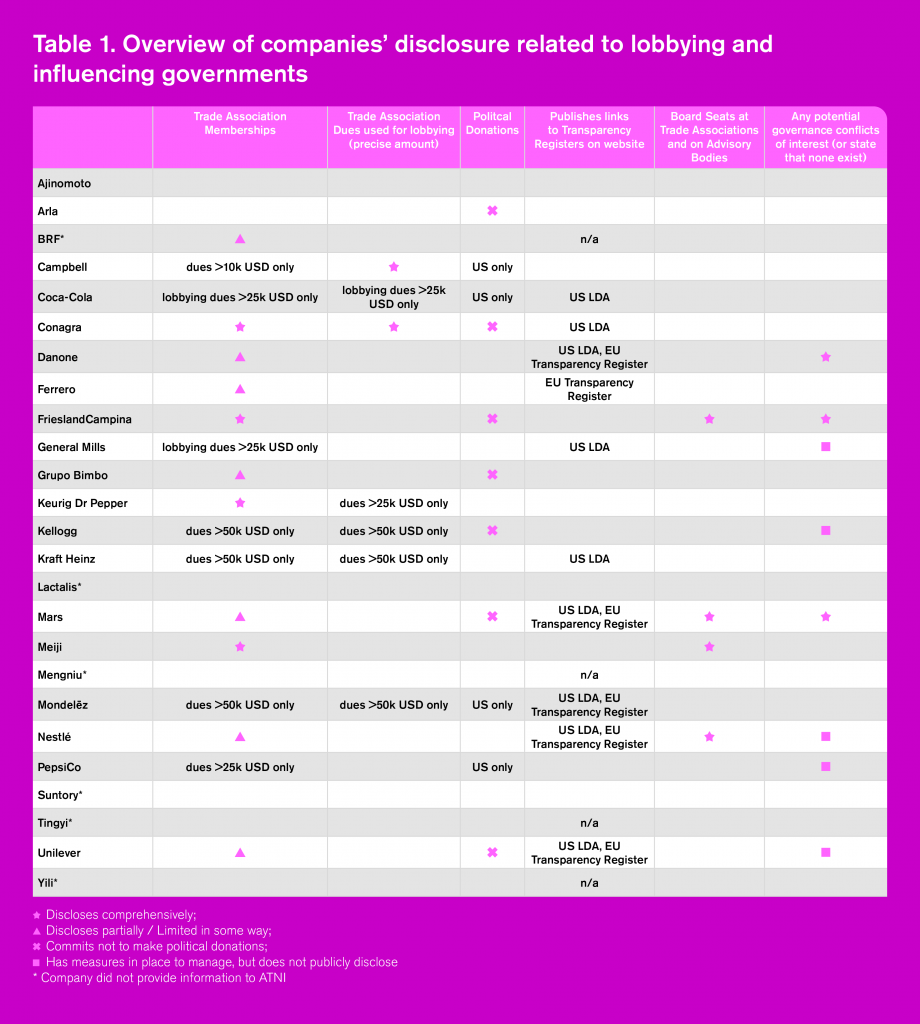
Whereas only two did so in 2018, 12 companies disclosed at least one lobbying position on important nutrition topics, with Front-Of-Pack labelling being the most common. PepsiCo continues to be the most transparent in this regard, being one of two companies (alongside General Mills) to explicitly state that they lobby for responsible marketing legislation. It is also one of two companies, alongside Coca-Cola, to disclose their position on fiscal measures. While both companies state that they oppose taxation on sugary beverages to address obesity, they are transparent about doing so.
General Mills, meanwhile, has significantly improved its disclosure, publishing a web page with numerous specific examples of its engagement with the US government (at both Federal and State levels) in relation to school feeding programs and food insecure communities; supporting strong Dietary Guidelines for Americans and redefining the official ‘Healthy’ definition; and labelling and marketing – including links to formal position statements and public consultation submissions on these matters. However, it makes no disclosure in relation to its lobbying in other markets.
Only three companies (FrieslandCampina, Kellogg, and General Mills) publicly disclose a commentary on their lobbying measures to prevent and address all forms of malnutrition. Kellogg, for example, describes in detail in its latest ‘Wellbeing Milestones’ report its engagement with numerous governments in the US, Latin America, and Europe to address hunger and malnutrition among children from low-income households.
Separate from lobbying, 10 companies now make some form of commitment to playing an active and constructive part in supporting governments’ efforts to combat all forms of malnutrition – with Unilever, Meiji, and Tingyi joining the six companies that already did so in 2018. These efforts include engaging in partnerships with public authorities, participating in their nutrition campaigns and programs, or responding to government calls to action. Meiji, for example, participates in the Nutrition Japan Public Private Platform (NJPPP), supporting the Japanese government’s global agenda to improve nutrition in association with the Tokyo Olympic and Paralympic Games, while Tingyi commits to actively participate in the Chinese government’s National Nutrition Plan (NNP).
Danone, Nestlé, FrieslandCampina, and PepsiCo, meanwhile, are the only companies that publish more comprehensive, globally-applicable commitments to support governments efforts to combat malnutrition. Nestlé, for example, in its ‘Policy on Transparent Interactions with Public Authorities’, states “shall, to the best of its abilities, support the actions of public authorities that aim to enhance quality of life and contribute to a healthier future for individuals and families, for communities and for the planet. This includes, but is not limited to, support to government efforts to address malnutrition and diet related chronic diseases.”
Thirteen companies provided concrete examples of actively working with governments to address malnutrition in the countries they are active in. However, only three (FrieslandCampina, Nestlé and Unilever) could do so for three or more countries. For example, Nestlé works with the Sri Lankan Government to raise awareness of iron deficiency and how to address it, reaching an estimated 13 million people. They have partnered with Ecuador’s Ministry of Education to produce and broadcast an educational TV series, “The Invincible Team”, to promote healthier habits, while also collaborating with regional governments in Mexico to promote a program aiming to improve the adoption of healthy lifestyles through educational activities for women. They also have a range of examples in India that were featured within the 2020 India Spotlight Index.
- Companies are encouraged to publicly commit to lobby responsibly; that is, with an explicit focus on supporting measures designed to improve health and nutrition with a solid grounding in independent, peer-reviewed science. They are advised develop adequate internal controls to ensure their lobbying activities align with company policy. More information can be found in the Responsible Lobbying Framework.
- To be as comprehensive and accurate as possible, all companies can expand their public disclosure of lobbying-related matters. This shows external stakeholders how the company is seeking to shape government policy, and demonstrates their commitment to lobby responsibly and fosters trust in doing so. Companies therefore are recommended to ensure they publish complete lists of the trade associations they engage with, as well as the specific dues they pay and how much of this is earmarked for lobbying purposes. They could consider following Coca Cola’s example and make it as easy as possible for stakeholders by publishing their lobbying disclosure reports directly on their websites. Moreover, while some companies provide links for US and EU-based lobbying reports, they are encouraged to do so for each market they actively lobby in (or state otherwise).
- Following Nestlé, FrieslandCampina, and Danone’s example, companies could take a more active and constructive role in supporting governments’ efforts to combat all forms of malnutrition, ensuring they do so not only in their home countries, but in other markets the company is active in.
G2 Stakeholder engagement
Seventeen companies provided evidence of some form of engagement with stakeholders designed to improve or develop their nutrition strategy, policies, or programs – a slight improvement from 2018. Eight companies report that they engage with civil society organizations, while seven companies state that they engage with academic institutions and scientific bodies, seven companies report engaging with international organizations (such as UN bodies), and three companies mention engaging with national-level public authorities. Meanwhile, nine have partnerships with, or formally support, prominent international initiatives/organizations that address malnutrition in priority populations. For example, seven companies are members of the SUN Business Network, six work with GAIN, and four work with the World Food Program.
That said, only eight companies (one fewer than in 2018) engage in a comprehensive, well-structured and focused manner – others could only provide more limited or relatively ad hoc examples. Of these eight, Nestlé, Danone, Ajinomoto, and Kellogg engaged with stakeholders internationally, while Mars, PepsiCo, FrieslandCampina and Mondelez provided examples from single markets only. A promising example is Kellogg, which states that it actively engages in ongoing conversations with multilateral organizations, governments, and NGOs. It does in order to: identify risks and opportunities in relation to nutrition; inform new programs and food innovations; and guide its Wellbeing Strategy, commercial strategy, and corporate policies relating to undernutrition. Danone now partners with FAO and local expert groups to analyze local health and nutrition contexts and develop strategies to address malnutrition in many of the markets its active in.
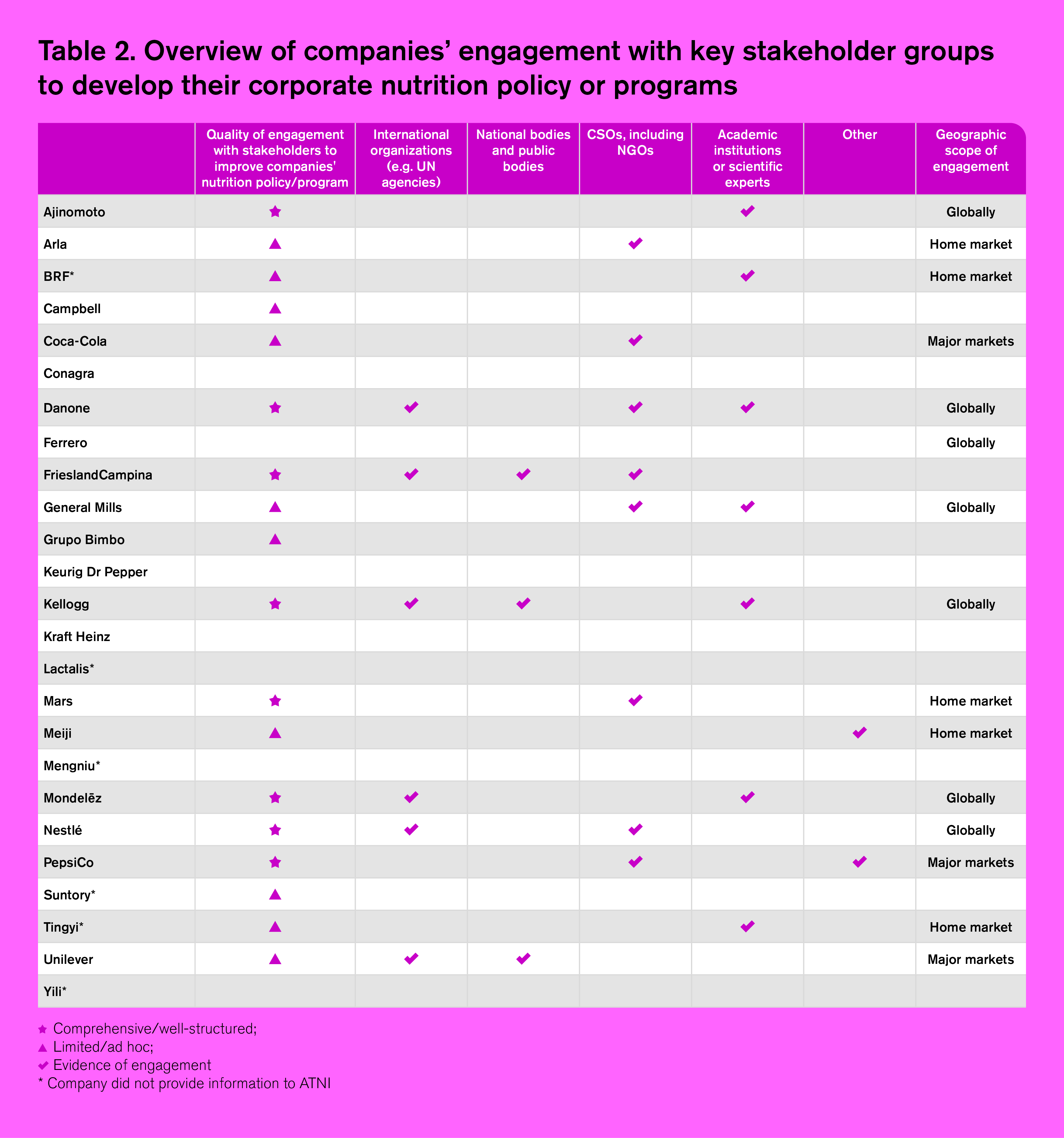
However, disclosure on companies’ stakeholder engagement was quite limited. While 13 companies publish a broad statement about the benefits of nutrition-related stakeholder dialogue, only two – Nestlé and Unilever – publish a detailed narrative about their stakeholder engagement. Meanwhile, no company was found to publicly disclose specific examples of how input has been used to adapt nutrition-related policies/programs.
Twelve companies were found to consult specialists on addressing obesity and diet-related chronic diseases on a strategic/Board level in some way. However, only five of these (Arla, Mars, Danone, Campbell’s, and General Mills) have a formal panel of experts – the other companies were found to consult on a less systematic, more ad-hoc basis. Campbell, for example, produced its first corporate position paper on sodium with consultation from a panel of scientific advisors.
Promisingly, all but four companies subscribe to at least one relevant voluntary international standard or code of conduct relating to food supply chains, most commonly the UN Guiding Principles on Business and Human Rights (19 companies), UN Global Compact (18 companies), and the OECD Guidelines for Multinational Enterprises (13 companies). In addition, Friesland Campina, Nestlé, Coca Cola, and Kraft Heinz all adhere to the ILO Tripartite Declaration of Principles concerning Multinational Enterprises and Social Policy (MNE Declaration); while Nestlé, Mars, Arla, and Danone are members of the 2016 FAO/OECD Guidance for Responsible Agricultural Supply Chains.
- When developing or updating their nutrition-related strategies, policies or programs, companies are recommended to conduct comprehensive and well-structured stakeholder engagement and expert consultation processes. Through two-way communication, gathering feedback, and learning, companies ensure that their strategies, policies, or programs effectively contribute to addressing public health issues in their respective markets.
- Companies are therefore advised to ensure they engage with a wide range of stakeholder types, including organizations and individuals with reputed expertise on nutrition-related topics, at both a national and international level.
- Meanwhile, companies that have not yet done so are encouraged to establish a formal panel of experts encompassing a wide-range of expertise and backgrounds to advise on their nutrition strategies, policies, and programs; especially in relation to addressing obesity and diet-related NCDs, undernutrition, and micronutrient deficiencies.
- In order to demonstrate to other stakeholders the engagement process that informed their new nutrition-related strategies, policies, or programs, companies are recommended to ensure they publicly disclose information about these processes, including who was engaged and how their feedback was taken on board.

